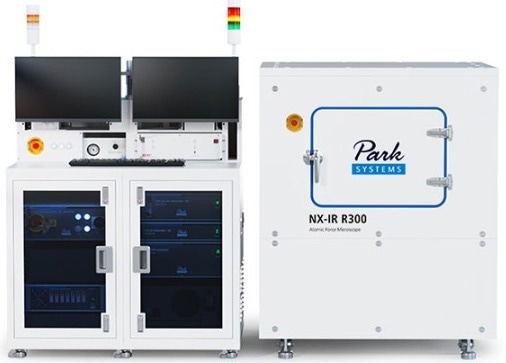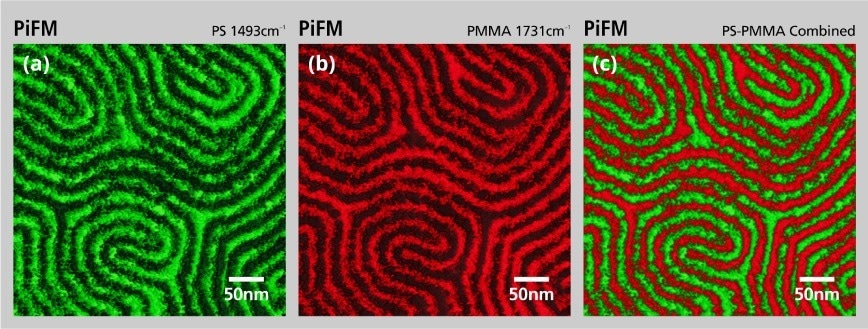Park NX-IR combines atomic force microscopy (AFM) with nanoscale infrared (IR) spectroscopy to characterize chemicals and materials.
The Park NX-IR integrates the most recent infrared spectroscopy technology, the photo-induced force microscopy (PiFM) from Molecular Vista, into the industry-leading Park AFM technology.
The PiFM infrared spectroscopy uses a non-contact detection technique that is superior to existing spectroscopy techniques, including the tapping PTIR (photothermal induced resonance), in terms of spatial resolution, measurement reliability, and sample safety.
The PiFM in Park NX-IR has the potential to perform high-resolution IR spectra analysis and IR absorption material imaging for accurate chemical composition measurements. The high-resolution IR spectra help retain a close correlation with standard FTIR (Fourier-transformed infrared) spectroscopy.
Moreover, Park NX-IR is also able to provide crucial material information at different depths through changes in detection methods, direct drive, and sideband bimodal detections.

Image Credit: Park Systems
Park NX-IR R300
The Nanoscale Infrared Spectro-Microscopy System For 300 mm Semiconductor Wafers
Park NX-IR R300 is a nanoscale infrared spectroscopy system primarily developed for semiconductor wafers ranging up to 300 mm. It offers chemical property information together with topographical and mechanical data for semiconductor research, failure analysis, and defect characterization at an unparalleled high nano-resolution.
Park NX-IR R300 combines highly sophisticated nanoscale IR spectroscopy with atomic force microscopy. It integrates the photo-induced force microscopy (PiFM) module from Molecular Vista onto the first-in-class Park NX20 300 mm AFM platform.
Park NX-IR R300 serves as a microscopy and spectroscopy system simultaneously. Chemical identification is available with a spatial resolution of 10 nm using Park NX-IR R300’s spectroscopy part. It employs a non-contact method that provides damage-free spectroscopy scanning and industry-leading spatial resolution.
The microscopy part of Park NX-IR R300 offers 3D topography along with sub-angstrom height precision and material imaging in nanometer lateral resolution.

Image Credit: Park Systems
Advantages of Park PiFM Spectroscopy
Unlike tapping or other procedures, Park NX-IR employs the non-contact approach to prevent damaging any portion of the sample. Moreover, it prevents any tip contamination during the scan operation, retaining the highest resolution and accuracy throughout the scan. In addition, the Park PiFM provides the user with spectroscopy information at varying depths of the sample through its direct drive and sideband bimodal detections.
High Spatial Resolution Material Imaging of Park PiFM Spectroscopy
Park NX-IR offers greater spatial resolution for both conventional IR spectroscopy and nanoscale IR methods. This is facilitated by Park AFM’s non-contact and sideband methods for the detection of chemical information.
Demonstrating Exceptional Spatial Resolution in Chemical Mapping

Material imaging of PS-b-PMMA block copolymer, (a) IR mapping images of PS at 1493 cm-1, (b) PMMA at 1731 cm-1 and (c) the overlayed mapping image of PS-PMMA. Image Credit: Park Systems